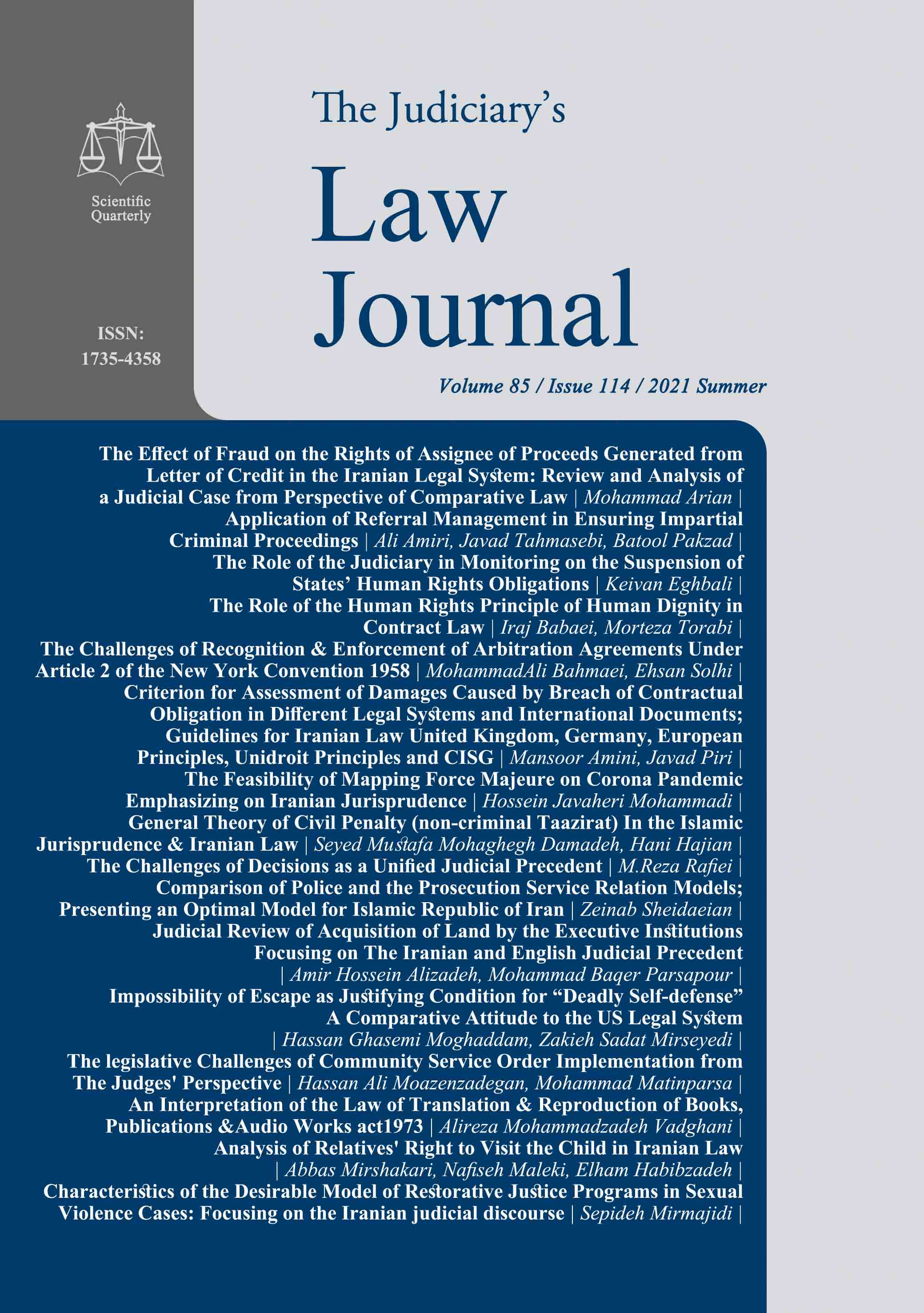Document Type : Research/Original/Regular Article
Authors
1 Associate Professor, Department of Criminal Law and Criminology, Faculty of Law and Political Science, Allameh Tabataba'i University, Tehran, Iran.
2 PhD Student in Criminal Law and Criminology, Faculty of Law and Political Science, Allameh Tabataba'i University, Tehran, Iran.
Abstract
Community service order is considered as the most prominent example of community-based punishments, entered in 2013 into the Iranian Legal and judicial literature. Therefore, it was expected legislator by a set of comprehensive statutes that are far from multiple challenges, created a context for effectiveness of this new institution in line with achieving its main aim of reforming and reintegrating the perpetrator. Thus, the main question of the present article will be whether the set of statutes and rules and in accordance with the targets intended for community service order, so that it leads to the greater effectiveness of this concept? In this regard, the authors at first studied 150 related judicial decisions and identified the judges issuing them (purposive sampling) as the main actors in this study and the gathered the data afterwards by conducting semi-structured in-depth interviews gathered its data. The data indicated that there are legal challenges at the sentencing stage and subsequently after conviction. The research findings also show that Iran's macro-judicial policies related to community service order (reducing the punishment of Community Service Order as an alternative to imprisonment and considering it as a means to reduce prison population) were not commensurate with the inherent goals of this community-based punishment. And finally, it has paved the way for many challenges. This disproportionate targeting can be categorized into the following two classifications: “Failure to identify actors in proportion to the nature of the punishment”, “Failure to identify situations appropriate to the nature of the punishment”.
Keywords
- Alternative Punishment
- Community-Based Punishment
- Imprisonment Alternative
- Community Service Order
- Host Organizations
Main Subjects
فارسی
- آشوری، محمد و جمال انصاری (1397)، «عوامل افزایش جمعیت کیفری ناشی از بازداشتهای پیش از محاکمه»، مجلۀ حقوقی دادگستری، سال هشتاد و دوم، شمارۀ 102.
- ایولاسال، ژان (1379)، «تحولات علوم جنایی و آموزش و تحقیقات جرمشناسی در فرانسه»، مترجم علیحسین نجفی ابرندآبادی، مجلۀ تحقیقات حقوقی، شمارۀ 31 و 32.
- باقی، عمادالدین و میرطاهر موسوی (1396)، «پیامدهای زندان شدن بر خانوادۀ زندانیان»، مطالعات و تحقیقات اجتماعی در ایران، دورۀ 6، شمارۀ 3.
- پرچمی، داود و فاطمه درخشان (1397)، «بررسی مجازاتهای اجتماعی جایگزین حبس و کاهش جرم»، مطالعات جامعهشناسی، سال دهم، شمارۀ چهلم.
- توجهی، عبدالعلی (1395)، آسیبشناسی قانون مجازات، چاپ سوم، تهران« مرکز مطبوعات و انتشارات قوه قضاییه.
- خاکساری، داوود و حسین غلامی (1398)، «عوامل مؤثر بر صدور مجازاتهای جایگزین حبس»، پژوهش حقوق کیفری، سال هفتم، شمارۀ بیستوششم.
- خواجهنوری، یاسمن (1386)، «سیاستهای جنایی قضایی ایران در قبال کودکان بزهکار: جلوهها، چالشها و آثار»، فصلنامۀ مطالعات پیشگیری از جرم، سال دوم، شمارۀ چهارم.
- دلاور، علی (1385)، مبانی نظری و عملی پژوهش در علوم انسانی و اجتماعی، چاپ پنجم، تهران: رشد.
- سبزهعلی، راضیه، محمود اشرافی و مسعود حیدری (1397). «آثار پرونده شخصیت در حقوق کیفری ایران»، مجلۀ حقوقی دادگستری، سال هشتاد و دوم، شمارۀ یکصدو چهارم.
- سودرین، اوزنور (1396)، جایگزینهای حبس در انگلستان و ویلز، آلمان و ترکیه، مترجمان حمیدرضا دانش ناری و حامد صفایی آتشگاه، تهران: نشر میزان.
- صادقی، آزاده (1398)، «ارزیابی اثربخشی سیاستهای پلیسی کنترل بازارهای خرید و فروش مواد مخدر»، مطالعات حقوق کیفری و جرمشناسی، دورۀ 49، شمارۀ 1.
- کاظمی، سیمین (1396)، «پیامدهای بهداشتی زندانهای شلوغ و ضرورت مداخله برای پیشگیری»، مجلۀ سلامت اجتماعی، دورۀ 4، شمارۀ 4.
- محسنی، فرید (1397)، شرح قانون مجازات اسلامی: مواد 1 تا 159، تهران: قوه قضاییه، مرکز مطبوعات و انتشارات.
- محمدیان پهنوار، یوسف (1396)، تحلیل کیفرشناختی خدمات عمومی رایگان در نظام حقوقی ایران، پایاننامه دورۀ کارشناسی ارشد حقوق جزا و جرمشناسی، تهران: دانشکده حقوقدانشگاه تربیت مدرس.
- ناظرزاده کرمانی، فرناز و زینب امامی غفاری (1393)، «بررسی رویه و نگرش قضات دادگاههای اطفال تهران بهجایگزینهای مجازات حبس»، فصلنامۀ دیدگاههای حقوق قضایی، شمارۀ 65، صص 180-157.
- نجفی ابرندآبادی، علیحسین (1397)، «تلطیف و ترمیمی شدن حقوق کیفری، با تأکید بر حقوق ایران»، در: فرجیها، محمد (زیر نظر)، عدالت ترمیمی؛ پل ارتباط میان تمدنهای جاده ابریشم (چکیده مقالات)، تهران، نشر میزان.
- یورگ آلبرشت، هانس (1395)، ازدحام در زندانها: شیوههای مؤثر برای مقابله با آن، راهبردها و شیوههای مطلوب برای مقابله با ازدحام جمعیت در نهادهای اصلاح و تربیت، ترجمه حسین غلامی، چاپ اول، تهران: انتشارات میزان.
انگلیسی
- Allen, Rob (2012), Reducing the Use of Imprisonment: What Can We Learn from Europe? Report for the Criminal Justice Alliance.
- Bottoms, Anthony; Gelsthorpe, Loraine; Rex, Sue (2001), Community Penalties; Change and challenges, Devon (UK): Willan Publishing.
- Gudders, Danique (2019), Penal Policy Transfer, Dissertation presented in partial fulfilment of the requirements for the degree of Doctor of Criminological Sciences, Leuven (Belgium), KU Leuven Faculty of Law.
- Pollähne, Helmut (2013), “Ethics Within the Prison System”, in Ethical Issues in Prison Psychiatry, by Norbert Konrad; Birgit A. Völlm; David N. Weisstub, Springer Netherlands.
- Martinson, Robert (1974), “What works? - Questions and Answers about Prison Reform”, Public Interest, vol. 35, pp. 22–54.
- Mills, Alice, Kendall, Kathleen (2018), Mental Health in Prisons, Palgrave Macmillan.
- Morris N.; Tonry M. (1990), Between Prison and Probation. Intermediate Punishment in a Rational Sentencing System, New York: Oxford University Press.
- Robinson, Gwen; McNeill, Fergus (2015), “Studying the Evolution of Community Punishment in Comparative Context”, pp. 1-13. In: Community Punishment; European perspectives, Springer.
- Russell, Craig (2018), Prison alternatives and rehabilitation, Broomall (United States of America): Mason Crest
- Tsang, Kwok Kuen; Dian Liu, Hong Y. (2019) “Introduction: Qualitative Research Methods in Empirical Social Sciences Studies—Young Scholars’ Perspectives and Experiences”. In: - Tsang, Kwok Kuen; Dian Liu, Hong Y. (eds) Challenges and Opportunities in Qualitative Research, Springer, Singapore.
- Scott, David; Flynn, Nick (2014). Prisons and Punishment; The Essentials, Second edition, London: SAGE Publications.

